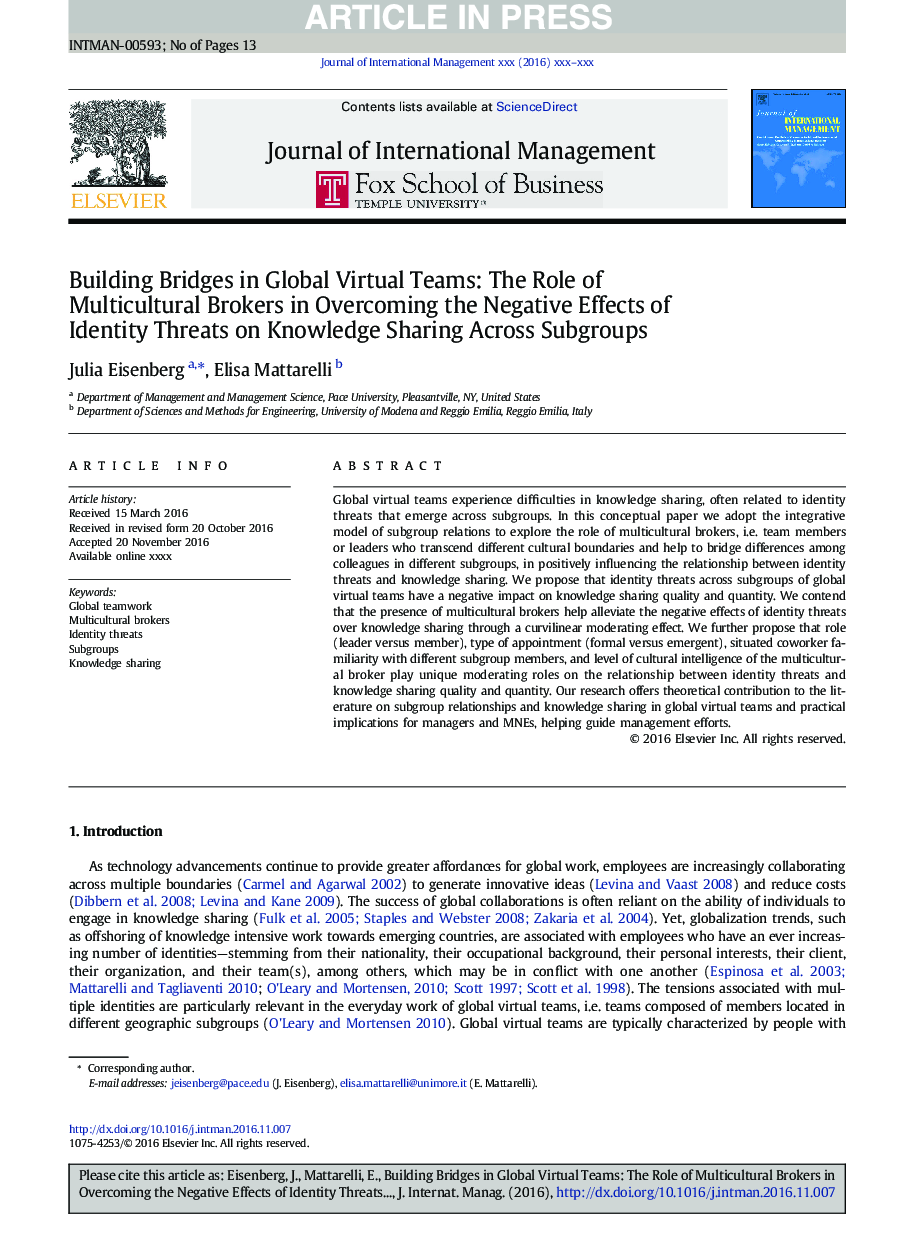| کد مقاله | کد نشریه | سال انتشار | مقاله انگلیسی | نسخه تمام متن |
|---|---|---|---|---|
| 7426562 | 1482885 | 2017 | 13 صفحه PDF | دانلود رایگان |
عنوان انگلیسی مقاله ISI
Building Bridges in Global Virtual Teams: The Role of Multicultural Brokers in Overcoming the Negative Effects of Identity Threats on Knowledge Sharing Across Subgroups
ترجمه فارسی عنوان
پل های ساختمان در تیم های مجازی جهانی: نقش کارفرمایان چند فرهنگی برای غلبه بر منافع تهدید هویت بر اشتراک دانش در زیر گروه ها
دانلود مقاله + سفارش ترجمه
دانلود مقاله ISI انگلیسی
رایگان برای ایرانیان
کلمات کلیدی
کار تیمی جهانی، کارگزاران چند فرهنگی، تهدید هویت، زیرگروه ها، به اشتراک گذاری دانش،
ترجمه چکیده
تیم های مجازی جهانی مشکلی در اشتراک دانش دارند، که اغلب در ارتباط با تهدیدات هویتی است که در زیر گروه ها ظاهر می شود. در این مقاله مفهومی، ما مدل ادغام روابط زیرگروه را برای بررسی نقش کارگزاران چند فرهنگی یعنی اعضای تیم یا رهبران که فراتر از مرزهای فرهنگی مختلف هستند و به ایجاد اختلاف میان همکاران در زیرگروه های مختلف، و تأثیر مثبت بر رابطه بین تهدیدهای هویت و به اشتراک گذاری دانش. ما پیشنهاد می کنیم که تهدیدات هویت در زیر گروه های تیم های مجازی جهانی تاثیر منفی بر کیفیت و کمیت اشتراک گذاری دانش داشته باشند. ما ادعا می کنیم که حضور کارگزاران چند فرهنگی به کاهش اثرات منفی تهدید هویت در برابر اشتراک دانش از طریق یک اثر تعدیل کننده منحنی کمک می کند. ما پیشنهاد می دهیم که نقش (رهبر در مقابل عضو)، نوع انتصاب (رسمی در مقابل خشونت)، آشنایی همکاران همکار با اعضای زیر گروه و سطح هوش فرهنگی کارگزار چند فرهنگی، نقش های منحصر به فرد منحصر به فرد در رابطه بین تهدیدهای هویت و اشتراک دانش کیفیت و کمیت. تحقیق ما به ارائه توضیحات در رابطه با روابط زیر گروه و به اشتراک گذاری دانش در تیم های مجازی جهانی و مفاهیم عملی برای مدیران و مؤسسات کمک می کند تا به هدایت تلاش های مدیریت کمک کند.
موضوعات مرتبط
علوم انسانی و اجتماعی
مدیریت، کسب و کار و حسابداری
کسب و کار و مدیریت بین المللی
چکیده انگلیسی
Global virtual teams experience difficulties in knowledge sharing, often related to identity threats that emerge across subgroups. In this conceptual paper we adopt the integrative model of subgroup relations to explore the role of multicultural brokers, i.e. team members or leaders who transcend different cultural boundaries and help to bridge differences among colleagues in different subgroups, in positively influencing the relationship between identity threats and knowledge sharing. We propose that identity threats across subgroups of global virtual teams have a negative impact on knowledge sharing quality and quantity. We contend that the presence of multicultural brokers help alleviate the negative effects of identity threats over knowledge sharing through a curvilinear moderating effect. We further propose that role (leader versus member), type of appointment (formal versus emergent), situated coworker familiarity with different subgroup members, and level of cultural intelligence of the multicultural broker play unique moderating roles on the relationship between identity threats and knowledge sharing quality and quantity. Our research offers theoretical contribution to the literature on subgroup relationships and knowledge sharing in global virtual teams and practical implications for managers and MNEs, helping guide management efforts.
ناشر
Database: Elsevier - ScienceDirect (ساینس دایرکت)
Journal: Journal of International Management - Volume 23, Issue 4, December 2017, Pages 399-411
Journal: Journal of International Management - Volume 23, Issue 4, December 2017, Pages 399-411
نویسندگان
Julia Eisenberg, Elisa Mattarelli,
